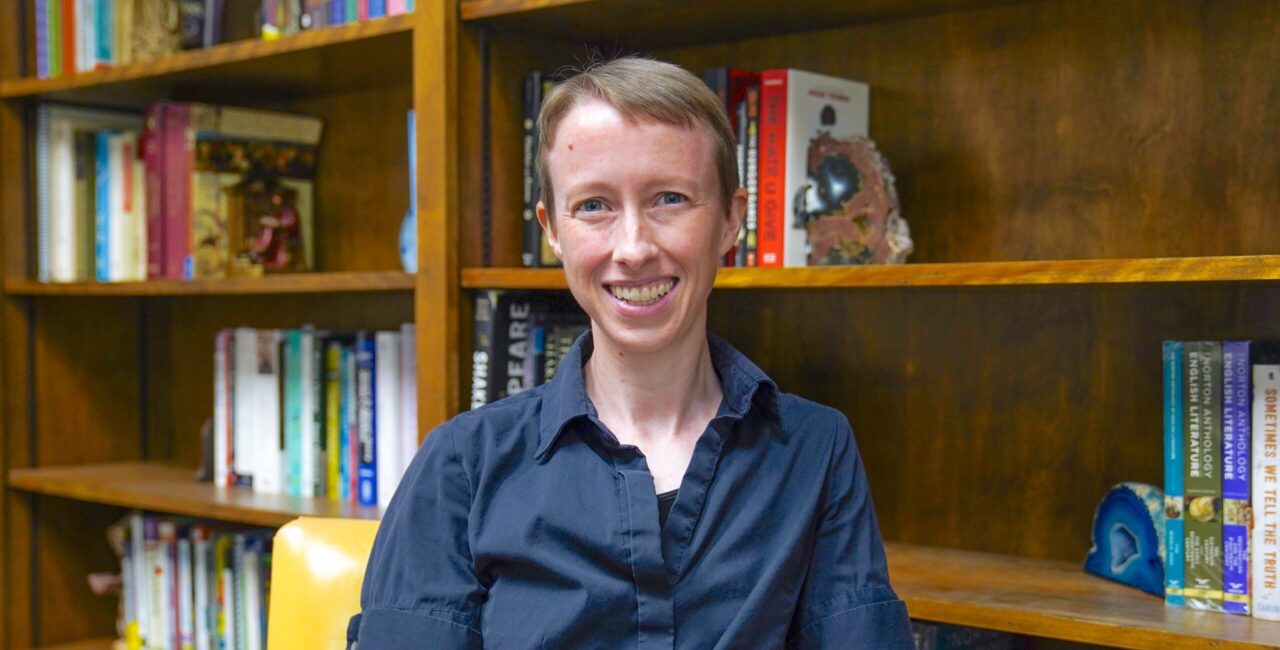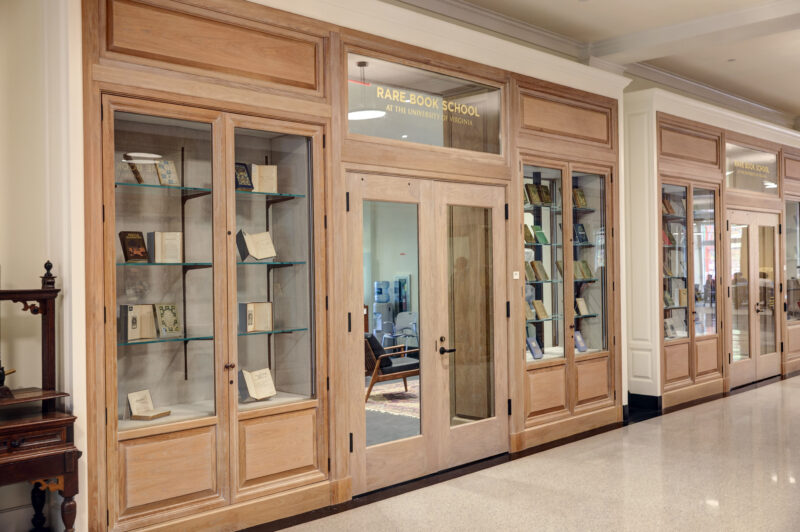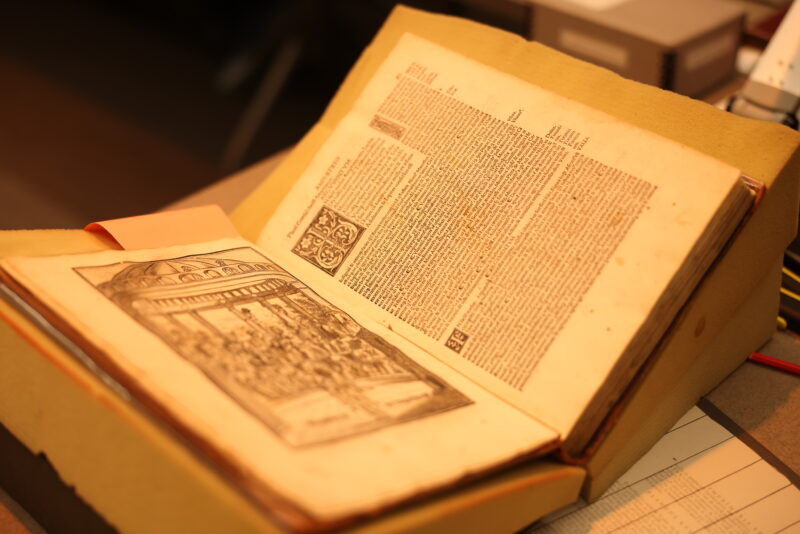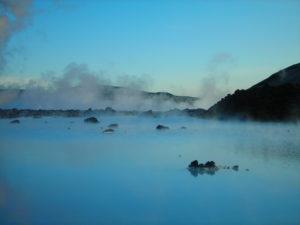
For the love of books: Professor goes to school
When Associate Professor of English Dr. Christine Schott says that she worked for a week this summer, you might suppose that she taught a short course somewhere. When she mentions that her work was at Rare Book School (RBS) at the University of Virginia, which offers courses in the summer and at other times, you might think that she was teaching or doing some sort of scholarly work. Well, yes and no.

Supporting the enterprise
Rare Book School offers continuing education opportunities “for students from all disciplines and skill levels to study the history of written, printed, and digital materials with leading scholars and professionals in the field,” according to the organization’s website.
“Because I’m a teacher in my day job, people often assume that I teach a course at RBS. While I might love to do that someday, what I actually do now is carry lots of boxes of books from their storage location to the classrooms where they’ll be used,” says Schott, who joined the Erskine College faculty in 2012.
“I inventory the books for whatever class I’m assisting with—and often there are hundreds for any given course—and I help make sure the collections are handled with care and repackaged and reshelved so that they remain safe.”
So not exactly scholarly work, right?
“People sometimes laugh when they find out that in the summers I work basically as a glorified gopher,” Schott admits, “but my work allows the RBS faculty to do their work without stressing over details like whether they have the right books in their classroom.”

Beginnings
Schott recalls her early acquaintance with RBS, when, as a graduate student at the University of Virginia with a keen interest in book history, she worked on a scholarly editing project, learning to read 15th century manuscripts.
“Somewhere in there I became aware of Rare Book School,” Schott says. “My first course at RBS was on textual editing, and then I began taking classes on paleography—reading old handwriting—and medieval manuscripts, and I’ve never stopped!”
When Schott first visited RBS, it was “housed in an unlikely-looking basement space at the bottom of the main library of the University of Virginia,” she says.
“They have since moved into a new and much more welcoming space after the library was renovated, but back then, it didn’t look very impressive, and they clearly needed more room,” she explains.
“But what they did in that small, dark basement absolutely amazed me.”
She caught the love
Rare Book School’s practice of bringing in international experts to teach courses in book history and related fields made a big impression on Schott. Beyond that, the staff at RBS “were simply the most welcoming and hardest working people I had ever met,” she says.

As for what Schott describes as “an unlikely-looking basement space” where RBA carried out its work before the library renovation? “The love of books filled that library basement to the brim,” she says.
“The love must have been catching, because I started working as summer staff in addition to taking courses, and I’ve returned to UVA to work at least a week or two every summer since, with the exception of the COVID years.”
One reason for Schott’s long association with Rare Book School is her dedication to scholarship. Over at least the last dozen years, dedication to her students has also motivated her.
Fun with book history
Schott wrote her dissertation on manuscript history, moving deeper into an area of interest which now animates her teaching. She cites two examples of the delight she took in her studies.
“I encountered some fascinating marginal notes and doodles in the manuscripts of Piers Plowman, a very weird allegorical poem from 14th century England,” she says. She was interested in the way readers “tried to make sense of this bizarre poem by writing notes in the margins.”

Later, during a period of study in Iceland, “I discovered that late medieval scribes had a charming habit of writing complaints into the margins of the manuscripts they were copying—bad weather was a favorite subject to grouch about.”
Stressing the connection between her research interests and her RBS experience, Schott says, “I would never have been able to read these manuscripts at all without the training I had received from Rare Book School.”
Bringing it to the classroom
When Schott became a teacher, “RBS grew even more important to what I do than when I was just a graduate student doing research,” she says.
She incorporates book history into her teaching, providing “manuscript fragments and pieces of parchment and quill pens” for students to examine.
“Knowing how we get the literature we read in class brings it to life in ways that just looking at an anthology never can,” Schott believes.
Her studies at RBS continue, in recent years extending to courses in book history outside of Europe on such topics as the history of the book in China, medieval Islamic manuscripts, and most recently, the printing press in Spanish America.
“With each new course, my understanding of how books shape our world grows and changes,” Schott says, “and I can bring that understanding into the classroom to share with my students.”
Christine M. Schott (B.A., Dartmouth College; M.A., University of Virginia; M.A., University of Iceland; M.F.A., Converse College; Ph.D., University of Virginia) was this year’s recipient of the Younts Excellence in Teaching Award at Erskine College. In 2023, she led a group of Erskine alumni and friends on a tour of Iceland. For more about this engaging professor, see past stories like this one.
Special thanks to Kim Curtis, who serves as Director of Communications & Outreach at Rare Book School.
Photo at top of page shows Dr. Christine Schott in her office in Bowie Divinity Hall on the Erskine campus.
